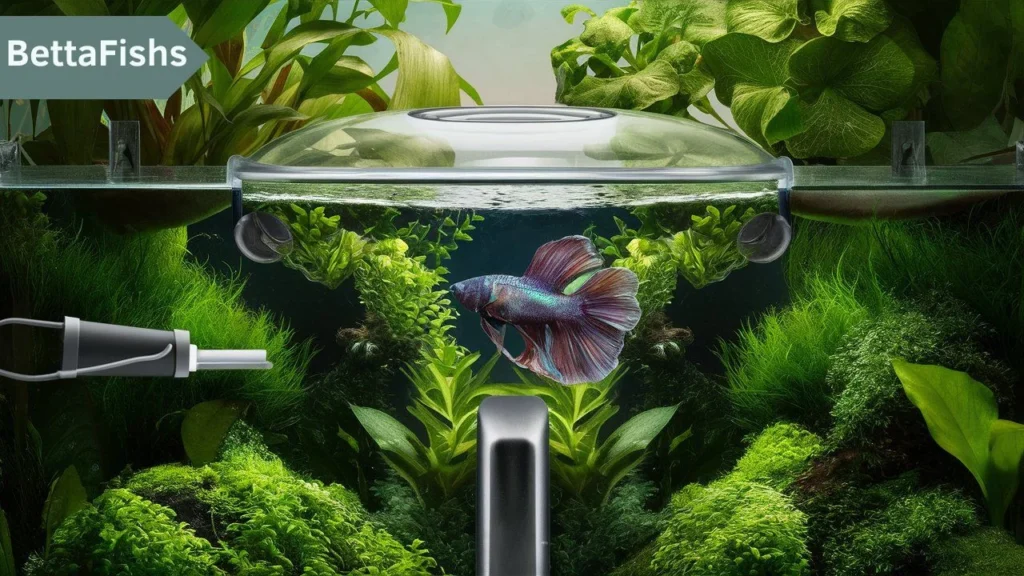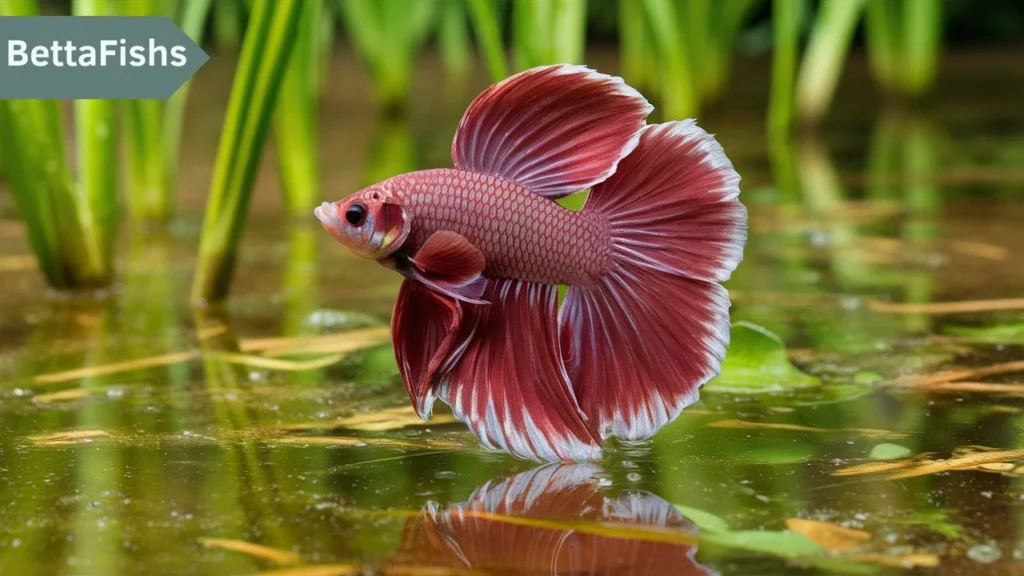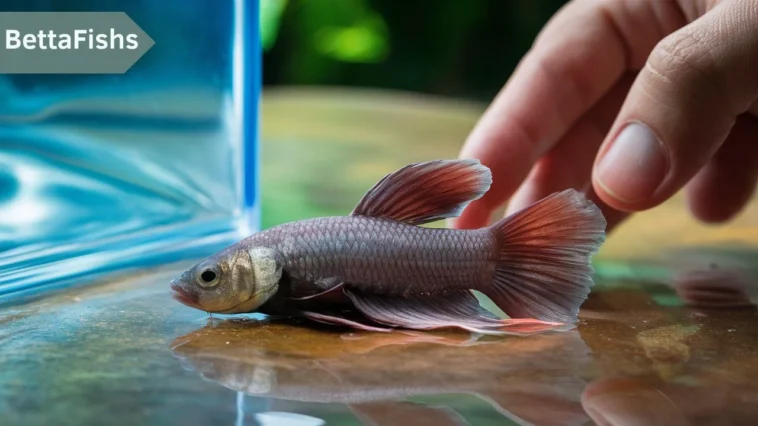Betta fish, often referred to as “Siamese fighting fish,” are well-known for their striking appearance and relatively easy care. However, like all fish, they rely on water for survival. The question of ” How long can a Betta fish live without water? ” is not only crucial for understanding their needs but also for ensuring their safety in your home aquarium.
Betta Fish
Physical Characteristics
Betta fish are small, typically ranging from 2.5 to 3 inches in length, with males boasting larger, more elaborate fins compared to females. Their vibrant colors and flowing tails make them a popular choice among fish enthusiasts.
Natural Habitat
Betta fish inhabit shallow waters naturally found in Southeast Asian rice fields, ponds, and leisurely-moving streams. These environments are often low in oxygen, which has led to the development of unique adaptations that allow bettas to survive in such conditions.
Special Adaptations
One of the most notable adaptations of the betta fish is its labyrinth organ, which allows it to breathe atmospheric air. This adaptation is crucial for its survival in oxygen-poor environments but is often misunderstood as an ability to live outside of water.
The Importance of Water for Betta Fish
Role of Water in Betta Fish’s Life
Water is essential for betta fish as it supports their bodily functions, provides oxygen, and allows them to maintain their temperature. Without water, a betta fish cannot survive for long, regardless of its adaptations.
Water Quality and Oxygenation
Betta fish thrive in clean, well-oxygenated water. Poor water quality can lead to stress, illness, and ultimately, death. It’s crucial to maintain the right balance of pH, temperature, and oxygen levels in their tank.
How Long Can a Betta Fish Live Without Water?
General Survival Time Out of Water
On average, a betta fish can survive out of water for approximately 10 to 15 minutes. This time can vary depending on several factors, including the environment and the fish’s health. Without water, their gills begin to dry out, and they can no longer breathe.
Factors Influencing Survival Time
The survival time of a betta fish out of water can be affected by temperature, humidity, and the surface the fish is on. Cooler, more humid environments may extend their survival time slightly, but even then, it’s a matter of minutes before irreversible damage occurs.

Factors Affecting Betta Fish Survival Out of Water
Temperature and Humidity
Higher humidity levels can slow the drying process of the fish’s gills, slightly extending survival time. However, higher temperatures can accelerate dehydration, shortening the time a betta can survive.
Age and Health of the Fish
Younger, healthier betta fish may have a better chance of surviving a short period out of water compared to older or sick fish. However, this difference is minimal and does not provide significant protection.
Duration of Exposure
The longer a betta fish is out of water, the more severe the damage to its body. Even a few extra minutes out of water can lead to fatal consequences.
Signs of Distress in Betta Fish
Physical Signs
Signs of distress in a betta fish that has been out of water include rapid gill movement, pale or discolored skin, and a lack of response to stimuli. The fish may also exhibit labored breathing if it is returned to water.
Behavioral Changes
Behavioral changes can include lethargy, lack of appetite, and unusual swimming patterns. These symptoms indicate that the fish is stressed and may be suffering from the effects of being out of water.
Emergency Steps if Your Betta Fish is Out of Water
Immediate Actions to Take
If you find your betta fish out of water, immediately and gently place it back into its tank. Avoid handling the fish more than necessary, as this can cause additional stress and injury.
How to Safely Return the Fish to Water
When returning the fish to water, ensure that the water is at the correct temperature and properly conditioned. Observe the fish closely for any signs of distress or injury.
The Role of the Labyrinth Organ
What is the Labyrinth Organ?
The labyrinth organ is a specialized structure in betta fish that allows them to breathe air directly from the surface. This organ is an adaptation to their natural environment, where oxygen levels in the water can be very low.
How It Helps Betta Fish Survive in Low Oxygen Environments
The labyrinth organ allows bettas to survive in water with low oxygen levels, but it does not mean they can survive without water. This organ helps them in oxygen-poor water, not in air alone.
Myths About Betta Fish and Water
Common Misconceptions
A common misconception is that betta fish can live in small bowls or without water for extended periods. This myth likely stems from their ability to breathe atmospheric air but is far from the truth.
Facts vs. Myths
While betta fish are hardy, they still require adequate water conditions to thrive. Believing they can live in poor conditions or out of water is dangerous and can lead to their untimely death.
How to Prevent Accidents
Proper Tank Setup
Ensure your betta fish’s tank is set up correctly with a secure lid to prevent the fish from jumping out. Betta fish are known to jump, especially if they are startled or stressed.
Covering the Tank
A covered tank is essential to prevent accidents. A lid with small openings for air circulation is ideal, allowing the fish to breathe while preventing escape.

Caring for a Betta Fish After an Incident
Monitoring Health Post-Incident
After returning a betta fish to water, monitor its behavior closely. Watch for signs of stress, such as labored breathing, lethargy, or a lack of appetite.
Signs of Recovery or Further Distress
A recovering betta fish will gradually resume normal behavior, including active swimming and eating. If the fish continues to show signs of distress, it may require further care or veterinary attention.
When to Seek Veterinary Help
Recognizing Serious Symptoms
If your betta fish shows signs of serious distress, such as continuous gasping for air, discolored skin, or fin rot, it’s time to seek help from a veterinarian who specializes in fish care.
Finding a Qualified Veterinarian
Not all veterinarians are equipped to handle fish, so it’s essential to find one with experience in aquatic animals. They can provide the necessary care and advice to help your betta fish recover.
Betta Fish Care Tips
Daily Care Routines
Maintaining a daily care routine is vital for the health of your betta fish. This includes feeding them a balanced diet, checking water quality, and ensuring their tank is clean and safe.
Long-Term Care and Health
Long-term care involves regular water changes, monitoring for signs of illness, and providing an enriching environment with plants and hiding spots to keep your betta fish happy and healthy.
The Importance of Regular Water Changes
How Often to Change Water
Regular water changes are crucial for maintaining a healthy environment for your betta fish. Typically, 25-50% of the tank water should be changed weekly, depending on the tank size and filtration system.
Benefits of Clean Water for Betta Fish
Clean water helps prevent the buildup of harmful toxins, supports the fish’s immune system, and reduces stress, all of which contribute to a longer, healthier life for your betta fish.
Conclusion
Betta fish are fascinating creatures that require proper care and attention to thrive. While they have unique adaptations that allow them to survive in low-oxygen environments, they cannot survive without water for more than a few minutes. Understanding the needs of your betta fish and providing a safe, clean environment is essential for their well-being. Always be mindful of their care requirements and take immediate action if they find themselves out of water.
FAQs
How often should I clean my betta fish tank?
It’s recommended to clean your betta fish tank and change 25-50% of the water weekly to maintain a healthy environment.
Can betta fish live in a bowl without a filter?
While betta fish can survive in a bowl without a filter, it’s not ideal. A filter helps maintain water quality, reducing the risk of disease and stress.
What should I do if my betta fish jumps out of the tank?
If your betta fish jumps out of the tank, immediately place it back into the water and monitor it for signs of distress.
How can I tell if my betta fish is healthy?
A healthy betta fish will be active, have vibrant colors, eat regularly, and display no signs of fin rot or other illnesses.
Do betta fish need a heater?
Yes, betta fish thrive in warm water, typically between 76-82°F (24-28°C). A heater is necessary to maintain a stable temperature in their tank.




